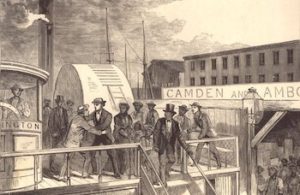
*Quakers and American abolition are affirmed on this date in 1787. Quakers (the Religious Society of Friends) were the only large religious American denomination to make it a requirement of membership to refuse to enslave people.
Quakers struggled internally for a century to come to this place. Quakers such as John Woolman and Benjamin Lay traveled and met with Quaker meetings and Quaker slave owners to bring them to see that owning slaves was against God’s direction and endangering their salvation. Resistance to calls for emancipation among some Quakers came not only because several Quakers were slave owners but because some of them profited from the slave trade. But by 1787, most Quaker meetings required members to release their enslaved people to freedom.
Besides disowning members who were enslavers, many Quakers became involved in movements to end slavery. Almost all antislavery movements before 1830 supported gradual emancipation. Many Quakers were active in forming and participating in organizations such as “The American Convention for Promoting the Abolition of Slavery and Improving the Condition of the African Race.” Quakers were involved in movements to encourage purchasing goods not dependent on slavery (known as the free produce movement).
Several Quakers supported colonization efforts, resettling freed people in Africa or other parts of the United States. Paul Cuffe, an African/Native American Quaker, proposed and began a colony in Sierra Leone that differed from other colonization proposals in that it had a feasible economic plan. For various reasons, Cuffe’s health issues and disinterest on the part of more Blacks relocating to Africa led to the colony's failure in Sierra Leone. More and more abolitionists, including several Quakers, became impatient and disillusioned with “gradualism.”
In the 1820s and 1830s, much of the Abolitionist movement called for immediate emancipation. Abolition leaders, such as William Lloyd Garrison (not a Quaker), saw gradualism as an excuse to postpone the freeing of enslaved people forever. An organizing convention of the American Anti-Slavery Society was held in Philadelphia in 1833. One-third of the attendees were Quakers. This convention called for the immediate emancipation of enslaved people. Several Quakers became fierce leaders, calling for immediate emancipation. Lucretia and James Mott, Levi Coffin (Underground Railroad), Angelina, and Sarah Grimke were Quakers who devoted their energy and lives to ending slavery.
Sarah Mapps Douglass, a Black woman, and her mother were founders of the Female Anti-Slavery Society. She and her mother faithfully attended but did not join a Quaker meeting, probably because Quakers seated Blacks in segregated areas during worship. Quakers were against slavery but less inclined to mix freely with Blacks. Some Quakers and Quaker organizations were not in line with immediate emancipation. Quaker organizations (meetings and yearly meetings) were often reluctant to take a public stand for immediate abolition. Some of this was related to the fact that several Quakers benefited from the slave trade.
Some Quakers felt that a political stand was too divisive and not something a religious organization should do. A few Quakers were chastised by their meetings or even disowned for being too radical, political, or active in the movement calling for immediate emancipation. So, while Quaker’s reputation for having a strong stand against slavery and working to end it has some credibility, Quakers were not united in their support of abolition.
Annette 'Nettie Kay' Smith
Quaker Press of Friends General Conference 2009